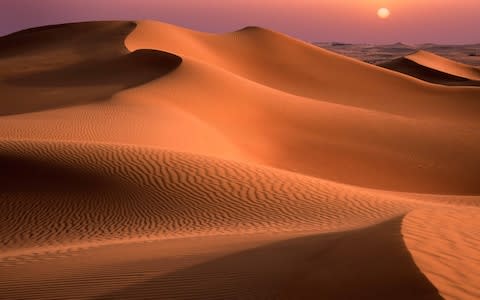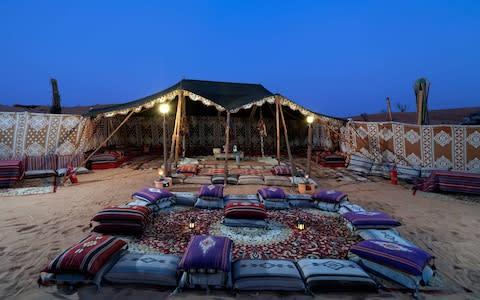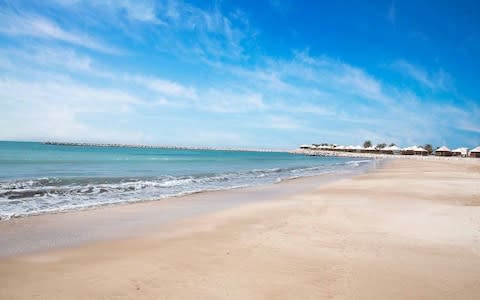How to experience what Dubai was like before the skyscrapers

“The horizon was just a sea of cranes,” a friend of mine told me of their recent trip to Dubai. They’d gone for a calming beach break – but ended up slumped on a man-made coast with a less-than-relaxing backdrop.
The city’s rapid and dramatic growth is well documented, but few consider the implications for the traditional way of life of the local population. After a vast influx of migrants from both Asia and the West, the Emirati are outnumbered by nine to one. Amid the glitz and glamour of the UAE, it is difficult to imagine how they lived their lives in the desert before the skyscrapers shot up. But there is a way.
A 40-minute drive from Dubai Airport, in the neighbouring emirate of Ras al Khaimah, there are myriad opportunities to experience the UAE of old. The city itself feels more authentic, simply because it isn’t as developed (although, admittedly, there are big hotels). Both the National Museum of Ras al Khaimah and the Bin Majid Museum offer worthwhile glimpses into Emirati ways of life, and a trip around the gold souk is a pleasant way to spend an evening. But it is beyond the city where you’ll find the best gateway to the region’s traditions.
There’s a curious thrill to seeing a road sign warning of camels crossing – it’s a precursor to seeing the actual thing. But driving through the desert in the early hours of the morning, having landed from a long-haul flight, I’m not yet best placed to discover the UAE’s wildlife at close proximity. To make matters worse, from the perspective of our satnav, we’re lost. Off grid.
We’re soon rescued by a friendly receptionist from the Bedouin Oasis Camp and driven off-road into the desert. Darting across sand dunes in the darkness induces palm sweats, as each unfolds to eclipse the next, and with it, any sense of my bearings.

But I wake in the morning well-rested, the sun filtering through my cloth ceiling, turning the tent a rich, burnt yellow. Although I’m in the depths of the desert, 60 miles from the plush hotels of Dubai, I’m in repose on a comfortable mattress, and my desert hut is warm and inviting.
From my veranda I overlook a handful of other huts, and before them, rows of ornate lanterns marking the camp’s pathway. The modest buildings are backdropped by sand dunes bearing the appearance of tsunamis; great waves of cinnamon-red sand occasionally interrupted by hardy ghaf trees protruding somehow from the depths. The sheltered location was chosen to protect guests from sand storms and high winds.
Come the afternoon, I gain a clearer sense of our isolation during a white-knuckle camel ride, included within the price of a stay (as is dinner). We bound up tall sand dunes and leap from near-vertical sand summits. Other than relaxing at the camp, guests can visit camel farms, go hiking in the nearby mountains, tour historical monuments and take in the city of Ras al Khaimah.

“That one’s Michael Schumacher,” Musabeh Al Khatri, the owner of a local camel farm, tells me, pointing at a camel. Musabeh is the brother of famous UAE Snapchatter Rashid Al Khatri and lives a short drive away. His Schumacher camel, he says, used to be the best in the region for racing. “Now he’s retired, but he was always number one.”
He points to two younger, more sprightly camels standing 20 metres away on the farm. “Their mum was the first camel when I started this farm six years ago,” he says. “Mum’s retired now so those two are my favourites.”
Camel racing has a rich history in the region and dates back centuries; the camels were believed to be God’s gift to the Bedouins. It remains a popular activity and usually takes place on a Friday morning. A decent racing camel has long back legs, a wide chest, small feet and a big head with a big nose. “Consider the wings of a Ferrari, you need airflow to help you go smooth,” explains Musabeh.
Within minutes we’re in another 4x4, driving parallel to four heaps of bounding brown flesh. Camels run like inelegant horses in a similar style of racing course: it’s a bizarre but must-see sight.
Later, as we enjoy a platter of dates, Musabeh tells me riders must be slight. “Camel racing is better than watching the Playstation,” he says. “When I was younger, I was a racer. It’s a great childhood.
“For the adults, you will be proud because if your camel wins the race, it will be worth more in the market. Then you get a reputation for producing camels that are trustworthy.”
A lesson in camel racing is guaranteed for those escaping the cities of the UAE for the barren countryside. The rise in the number of Beduin camps is testament to a growing desire among travellers to see the destination from another perspective. Musabeh is in the planning stages of building his own desert camping experience comprising ten sun-facing geodome tents.
Salem Alweshahi, who runs the Emirati Experience travel company, is launching an overnight nature experience, taking bookings for two-day hiking and walking trips across local mountain ranges.
“This is my village,” Salem says. He’s standing on a recently-laid driveway, overlooking a greyish expanse of mountains and, in the foreground, a date farm. We’re in Wadi Showka, a 40-minute drive through the desert into the mountains which Salem describes as “a quiet area, better than the noise in the middle of the city.”

Salem works in Abu Dhabi, but in his free time runs adventure experiences taking in historic stone houses, ancient rock drawings, rock pools for swimming, mountain hikes, bee keeping and barbecuing. Salem emphasises their popularity within corporate circles. Big firms want to “show employees old traditions and how people lived before.”
“My idea has turned a hobby into a real business,” he says as we overlook the smart new accommodation, where evening entertainment and food will be laid on as respite from the hiking. “We don’t buy anything from outside. On the hikes we survive as we did hundreds of years ago – from honey and cows.”

How to do it
Bedouin Oasis Camp takes bookings on Airbnb. Call Musabeh on +971 55 996 2211 to arrange a camel farm tour and camel racing experience.
Inspiration for your inbox
Sign up to Telegraph Travel's new weekly newsletter for the latest features, advice, competitions, exclusive deals and comment.


